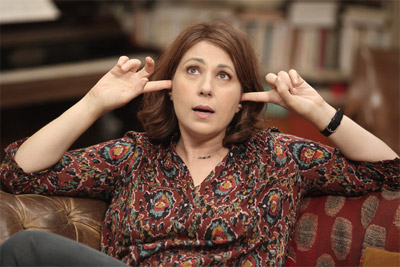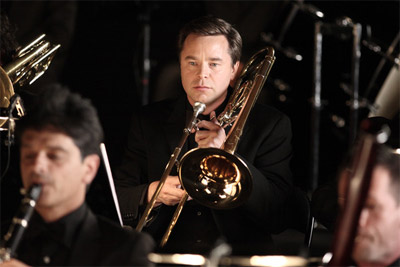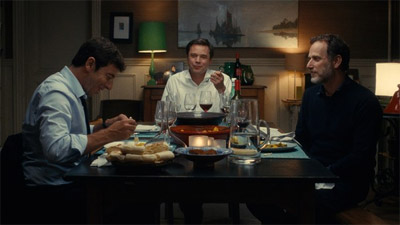Valerie Benguigui and Charles Berling What's In A Name Interview

Valerie Benguigui and Charles Berling What's In A Name Interview
Cast: Patrick Bruel, Valerie Benguigui, Charles Berling
Director: Matthieu Delaporte and Alexandre De La Patelliere
Rated: M
Running Time: 109 minutes
Synopsis: Vincent, a successful man in his forties, is about to become a father for the first time. He is invited to dinner with his sister Élisabeth and her husband Pierre, where he meets Claude, a childhood friend. As they wait for Vincent's young and permanently late wife Anna to arrive, the others ply him good-naturedly with questions about his future fatherhood. But when Vincent is asked if he's already chosen a name for the baby, his answer sows uproar among the assembled company.
What's In A Name
Release Date: July 25th, 2013
Interview with Valerie Benguigui
Question: Babou is a particularly interesting character precisely because, out of the whole group, she's the only one who isn't called by her real name but by a diminutive. It's as if this woman had allowed herself to be diminished by those close to her...
Valerie Benguigui: Yes, no doubt, but she accepted that. At the start, she tagged on to the friendship between the two guys, as Vincent's sister, then as Pierre's wife. Over time, she has put more and more of herself to one side. We all have our secrets as actors of how to bring our characters to life. I made up a story about Babou; I imagined her always in the background, wanting to be part of the group whose main figures were her brother and her future husband. In parallel, she's formed a more intimate bond with Claude, who is more gentle, almost feminine. So she's allowed herself to be dominated, she's had kids, she put her career on hold, accepting these compromises for the sake of love and for a quiet life.
Question: Until it all boils over in an explosion.
Valerie Benguigui: Yes, because she's a sensitive, generous, naive woman, but also intelligent. She no doubt had a lot of possibilities for her future, real potential, lots of dreams. And on the night of that dinner, she's ready; she feels the time is ripe to lance the boil. You cannot eternally put your life on hold without getting something back in return. The ingratitude becomes unbearable for her, because she also has her own opinion.
Question: What does Babou have in common with you or the people you know?
Valerie Benguigui: A lot, but in the end, not that much! At a time in my life, I tended to forget my own objectives, but I've never been into sacrifice. That's where I identify with her. The success of the play is a lot to do with the casting done by Bernard Murat.
Question: In your personal life, did the choice of César and Abraham as names for your sons pose any problems?
Valerie Benguigui: For my parents, it provided the opportunity for a forthright discussion! They thought César was a bit old and didn't really understand, but for Abraham, it got more complicated. My mother said to me: 'Do you realize what you're pinning on him? It's a big deal." They were very scared; scared it would be a heavy burden, scared of anti-Semitism, scared he would be mocked. To the point where everyone said to us: 'You're crazy." When my son was born, my husband and I called him Eli for a morning at the clinic. And then, after a bit of rest, we looked at each other and agreed he didn't look like an 'Eli", so we crossed the name out on the file and gave him back his own. Today, everything's fine for everyone; César and Abraham are terrific names.
 Question: What's In A Name? also poses some questions about society, notably the place of women.
Question: What's In A Name? also poses some questions about society, notably the place of women.
Valerie Benguigui: Personally, I don't live in a backward or macho environment, but I am often confronted with little actions or comments, which I soon put straight, gently and with humor. At the same time, I think that when it comes to equality, we've got a long way to go. In the film Babou, the wife and mother of the family, is relegated to the kitchen, but she's accepted that role, so it's her responsibility, at least up until that decisive evening.
Question: What did you find interesting about following this character from stage to screen?
Valerie Benguigui: I was very curious about the transition, and at the same time, I wondered what the result would be. How could we undo what we'd done? Having never participated in an adaptation of one of my plays for the cinema, I was convinced that theatre and movies were based on the same process. What I know now is that you don't approach them in the same way. Quite simply because on stage, you have to put on a show for 800 people every night, thinking about the spectator at the back of the room, whilst in movies, the camera can come right up close to capture the slightest flicker of an eyelash. So you have to pick it all apart, speak differently, and invent another technique. It was a fascinating job, amplified by the fact that I changed husband, with Charles Berling replacing Jean-Michel Dupuis.
Question: Indeed, the spirit of the troupe seems to have been very important on this project, both for the play and the film.
Valerie Benguigui: And it came about quite naturally. In the theatre, you don't have much choice: without a tight-knit group, it's very difficult to act. Everything has to happen together; we have to listen to each other, and talk to each other. In the event it all went very well between us, so everyone was delighted to get back together for the film, with the other actors and the writers. To tell the truth, our dressing rooms were very comfortable, but we preferred to stay in a sort of little salon next to the set to hear what was going on and to chat with Alexandre and Matthieu.
Question: You have had some wonderful experiences in comedy films from Would I Lie To You? to Safari through Les Tuche, Hey, Good Looking! and Pur Week-end. What's In A Name? seems to combine several comedy styles.
Valerie Benguigui: It's everything I love! There's no doubt I adore making people laugh, but I also need some authenticity, and some depth. I couldn't tackle a role solely from the angle of comedy, especially knowing that when tragedy comes into it, it's even funnier. Then, I'm in my element. That said, I see myself much more as a tragic actor than as a comic, but apparently when I cry, I make people laugh, so there you go. With What's In A Name?, thanks to Matthieu and Alexandre, I am fulfilled.
Question: Your career is already rich with exciting encounters and outstanding characters, but the role of Babou seems to have a special importance.
Valerie Benguigui: Oh, she's definitely not like the others. I've rarely had a character as rounded and wonderful. As an actor, it was a gift, as was my character in HEY, GOOD LOOKING! I'd already been offered the role of Babou on stage, and then I was lucky enough to bring her to life on film. I know a lot of actors would have fought to get that role. Personally, I like to play extreme characters because experiencing intense emotions is what interests and drives me. They might be a long way from who I am, but if they've been through things I don't know, I'd like to play that sort of woman: Françoise Meyers-Bettencourt, for example. I love the fascinating relationship between the daughter and the mother. I'd also like to play a hooker, a nun, a drug addict, a psychotic, and a madwoman. I'd love all that!
Interview with Charles Berling
Question: You're the newcomer in this adventure since you weren't part of the cast for the stage play, which blends a typical theatre farce plot with some more profound reflections.
Charles Berling: I saw the play and I was struck by its rhythm, that sense the characters are permanently bouncing off each other. What I like about that kind of writing is that it corresponds to a tableau of contemporary France. It was true on stage and it's the same on screen. As if certain typically French anxieties were translated by a totally unbridled game, and one that is quite violent, which results in something that is genuinely funny because that violence is absolutely accepted. Pierre, my character, represents a cultivated kind of Frenchman – one who is in work, but who is losing status and losing his reference points. He is the opposite of Vincent, Patrick Bruel's character, who is quite comfortable with the idea of earning money, who is not encumbered by principles and who thrives in our current society. Their confrontation is terrific, and what's more, the energy of the shoot fed into this: it corresponds to what the writers came up with and the reality they are describing. French farce always tries to avoid contentious subjects: here, although the structure is in fact quite classic, Matthieu and Alexandre have added some crueler, almost trashy ingredients. And I was really drawn to this excessive side.
Question: How do you find your place in a group of actors who already have done 250 performances together and therefore have a lot in common?
Charles Berling: We talked about that with the writers and it was the occasion to destabilize certain habits, to stir things up a bit. For me, it was a film and I didn't have to 'reinvent" myself in relation to the original play. Jean-Michel Dupuis, who played Pierre in the theatre, was great, but from the start, it was very clear that I would offer something else. There was no question of copying him. The fact they chose me automatically resulted in something different, and the need to find a different balance within this quintet. It was also my good fortune to have partners who had complete mastery over their roles, and to act on a sensational set with directors who knew their text inside out and who were even ready to modify it when necessary. But it was all done with sensitivity and a lot of precision, because with scripts as good as this one, there aren't so many different ways to act them.
Question: Let's come to Pierre, your character in What's In A Name?. What strikes one first is his 'bourgeois-bohemian" egocentric side. Then as the narrative progresses, one gradually realises what a terrible coward he is in his approach to life.
Charles Berling: Yes, he's one of those people who retains a fabulous appetite for life, genuine energy, but who, with the passage of time, have allowed themselves to be trapped by appearances, the banalities of existence – hence his 'bobo" side. He's no longer really in touch with the reality of what's going on around him. For example, when he is attacked by Babou, his wife, who all of a sudden reveals her quirks, her mistakes and her failings, he's the most surprised. Pierre is one of those cultivated, left-leaning men, in favor of all those things like equality, and yet at the same time who behave exactly like Vincent, who's apparently poles apart in terms of values. He judges others on the faults he's developing himself. The fact that he's invented a life for himself that he believes in leads to his cowardice.
Question: You know that world well: as an artist, obviously, but also through your own family because one of your uncles was the celebrated literary critic Raymond Picard. Did you draw inspiration from this family universe to construct Pierre's character?
Charles Berling: Yes, of course. I know this form of middle class, cultural rigidity very well, and what's more, I have it deep down in me. I just had to draw on that, hoping all the same not to reach a point of no return! That's why this comedy is interesting: you identify with and you can recognize your own foibles. This cruel painting at once provokes laughter and relieves us. I approached the role with a lot of excitement and delight because it allowed me to tackle things I hadn't confronted before: that hysteria, that excessiveness in power relations, and that abominable authoritarianism!
Question: Alongside the great comic device in the film, the central question is in fact: 'Can friendship survive a crisis, a total laying bare of all the resentment that has been simmering for years?
Charles Berling: And the answer is yes. Moreover, that is what the writers have captured so brilliantly. After everything that is said, things pick up again. And not only their friendship withstands this crisis, but it feeds off what it just went through. That brings us back to what I said: it's typically French. If the play works so well, it's because Alexandre and Matthieu are pure products of our national culture. And when you know them, you notice that between the lines of their text, they're also speaking a little about themselves. That's what makes a good writer: they don't spare themselves. That evening, that totally incandescent hour-and-a-half, crystallizes all the passions that have always motivated them.
 Question: Even within the couple formed by Pierre and Babou, there are also things unsaid, resentment and cowardice which suddenly flare up.
Question: Even within the couple formed by Pierre and Babou, there are also things unsaid, resentment and cowardice which suddenly flare up.
Charles Berling: Yes, but there again, nothing will be destroyed by this terrible evening because the bond that unites these people is very strong. OK, all these characters appear totally nuts, but also – and this is what's most important – they are full of love for each other.
Question: Do you have a serene memory of calling your son Émile?
Charles Berling: Let's say that, unlike my brother, I stayed in more classic territory. Émile is a classic name, while my nephew and niece are called Balthazard and Maia. So it's true that the names of my children in the film, Apollin and Myrtille, made me think about my brother's choices. But there again, it's very well observed by the writers: we live in a changing society, which is in search of identity, and the choice of names has been turned on its head in the past 20 years. What's In A Name? comes back to that, to something deeper than the simple comedy of theatre, even to some more painful truths like the two faces of France which are currently confronting each other.
Question: What's In A Name? recalls another of your films, Ridicule by Patrice Leconte, with this idea of the dinner during which the participants take a dig at each other under the guise of culture, and it's all about appearance, despite the spinelessness of certain guests.
Charles Berling: One of the similarities concerns the very French pleasure in using language, in talking, of engaging in full-blown verbal jousting over a meal. Even if it means going too far, as the abbot played by Bernard Giraudeau did in front of the king in Ridicule.
Question: You excel in this register of comedy which has something to say and yet, we don't often see you in this kind of film.
What's In A Name
Release Date: July 25th, 2013
MORE





